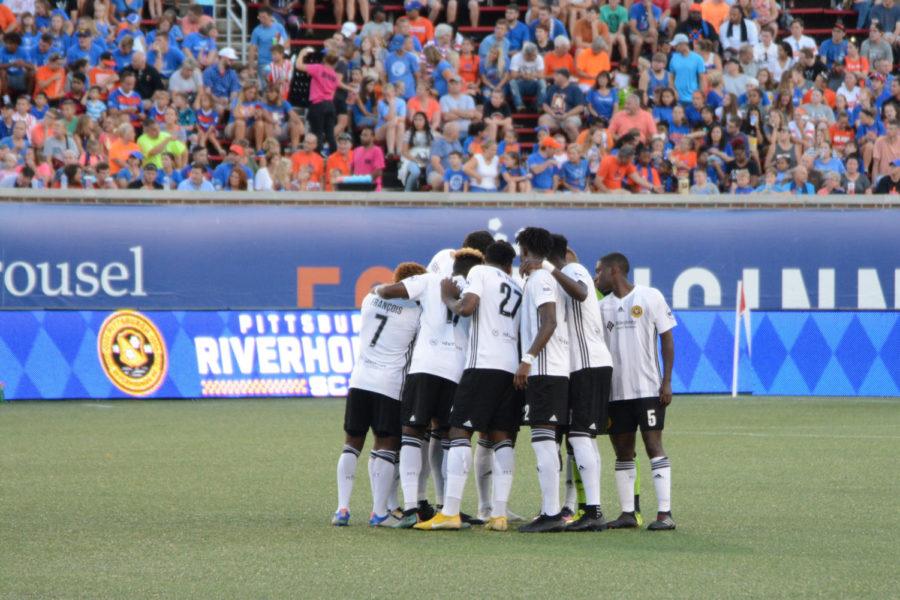Column: Riverhounds strive for success as Pittsburgh’s pro soccer team
The Pittsburgh Riverhounds in a huddle during a match against Cincinnati FC at Nippert Stadium in Cincinnati on Sept. 1. (Image via Wikimedia Commons)
October 17, 2018
Fans and media in Pittsburgh constantly discuss, debate and devote their every waking moment to the professional teams in the City. The Steelers, Pirates and Penguins are integral parts of the fabric of Pittsburgh and their performances affect the City’s everyday mood. The excellent history of these teams has added prestige to Pittsburgh, making it the renowned “City of Champions.”
When the Pittsburgh Riverhounds emerged in 1998 in the United Soccer League a tier beneath Major League Soccer, which at that point was called the A-League, they shook up the dynamic that had been around Pittsburgh for decades. As the Riverhounds prepare to host a first-round playoff game Saturday — the first home postseason game in the club’s history — their achievements shouldn’t go unnoticed. How much success will it take for soccer to be among Pittsburgh’s sources of pride? The issue goes beyond just the performance of the Riverhounds — the credibility of their league and soccer as a whole in American culture are at play as well.
While soccer may be the most popular sport worldwide, Americans have always regarded it as a second-tier sport, and sometimes even with hostility. There was never a huge following from the American public, as other sports took up the majority of interest. While baseball was still the most popular sport in the first half of the 20th century and football and basketball were forming successful leagues of their own, the attempted soccer leagues of the American Soccer League and United States Football Association all ended up failing.
The beginning of Major League Soccer in 1996 seemed to bring about a new era — one intent on finally bringing the quality seen in soccer around the world to the United States. The development of the league over the last 20 years coincided with the development of the U.S. Men’s National Team as a competitor in world football competitions like the World Cup.
Starting with David Beckham in 2007, the MLS has established itself as the top league for aging superstars to play in at the end of their careers. Other notable players who left the top European leagues for the MLS include Steven Gerrard, Didier Drogba, Frank Lampard and Zlatan Ibrahimovic.
The development of the MLS has also led to the development of more soccer leagues. The United Soccer League, in which the Riverhounds compete, is the second-tier league of American professional soccer and acts as a feeder league for the MLS. The USL very much acts like the equivalent of the minor league for baseball, and to a similar extent, like college teams for the NFL in football.
Since the Riverhounds debuted 20 years ago, they have grown as a professional team concurrently with the MLS and USL. In their early years, the Riverhounds solidified themselves as a pro team through the play of David Flavius, an international player from the Caribbean island nation of Saint Lucia who still holds the records for games played and goals scored for the Riverhounds.
The Riverhounds moved to the $10.2 million Highmark Stadium in 2013 as attendance and exposure increased. With the heightened interest in American soccer came more opportunities for competition in the sport. This included games between the Riverhounds and MLS teams and the establishment of the Keystone Derby between the Riverhounds and Penn FC of Harrisburg.
An important change in branding happened this year, with the club changing its colors from the blue and black worn before to the traditional Pittsburgh colors of black and gold. With this change comes the debate of the Riverhounds’ place in Pittsburgh sports. Although brushed aside for years as a minor league team for a sport that no American — let alone Pittsburgher — cares for, the Riverhounds have recently shown through their triumphs that they may deserve to sport the black and gold of the City’s champions. Their victories, coupled with the development of soccer in America over the last 20 years and the increase in interest for the MLS and USL, may just ignite a shift in thinking on the Riverhounds.
If Pittsburghers need more proof about the credibility of a USL soccer team increasing its reputation as a professional team, they only need to look about 300 miles west to a familiar city.
FC Cincinnati is also a USL team, yet it is in its last season as a second division team. It will compete in the MLS next year due to the fantastic attendance and an outstanding fan base that has supported the team through its successful USL beginnings. The average attendance for an FC Cincinnati game in 2018 was 25,194 while the average for the Major League Baseball’s Cincinnati Reds was 20,116. In a town dominated by football and baseball, the hallmarks of American sports, soccer is challenging to become king.
For the first time in their history, the Riverhounds will host a playoff game, facing off against Bethlehem Steel FC on Saturday in the first round of the USL Cup Playoffs. The Riverhounds finished third in the Eastern Conference while the Steel finished sixth. Holding a slight advantage, the Riverhounds have their goals set on a championship — and their inclusion in the prestigious group of professional Pittsburgh sports teams.








